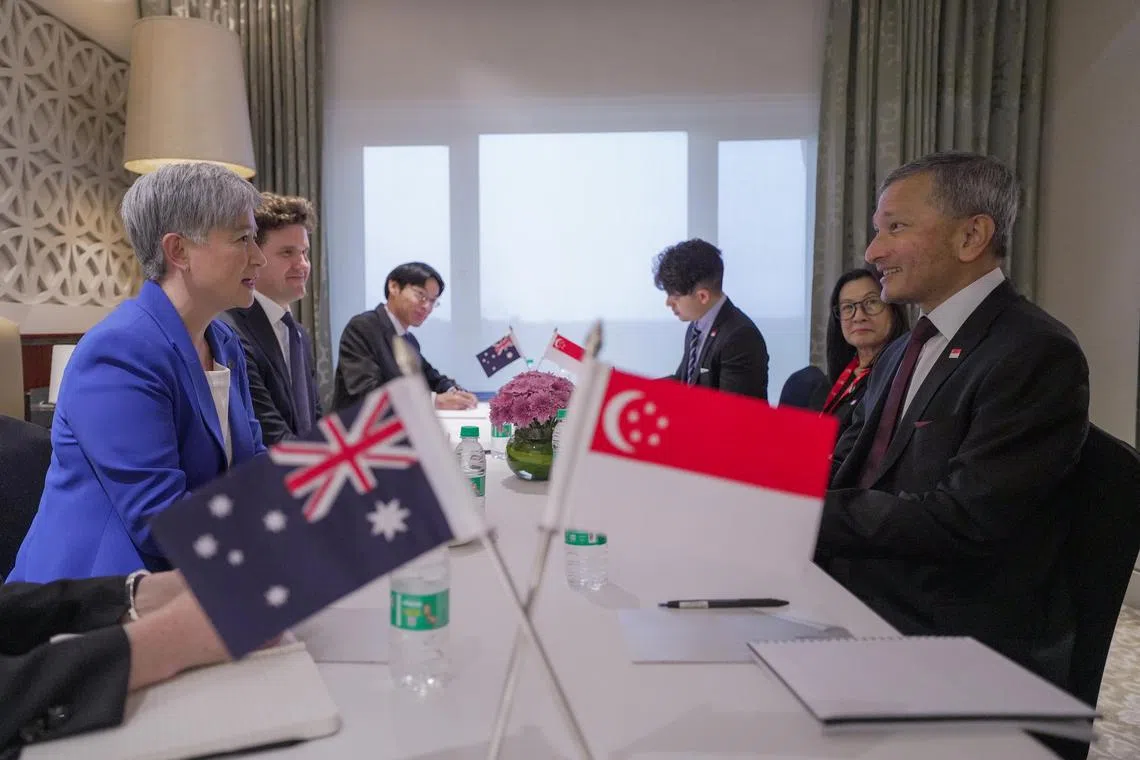Vivian Balakrishnan urges US and China to de-escalate tensions in Taiwan Strait at G-20 talks
Sign up now: Get insights on Asia's fast-moving developments

Minister for Foreign Affairs Vivian Balakrishnan at the G-20 Foreign Ministers’ Meeting in New Delhi.
PHOTO: MFA
Follow topic:
NEW DELHI - Singapore’s Minister for Foreign Affairs Vivian Balakrishnan urged China and the US to de-escalate tensions in the Taiwan Strait and the South China Sea at the Group of 20 (G-20) Foreign Ministers’ Meeting in New Delhi on Thursday.
Speaking at a plenary session on strengthening multilateralism, Dr Balakrishnan said there was a need for the “two biggest superpowers in the room to engage intensely and comprehensively with each other. They need to de-escalate the tensions for those of us in Asia, especially in the Taiwan Strait and the South China Sea”.
Underlining the importance of multilateralism, he added: “We need the leadership of both the US and China if we are to deal with any of the global challenges that confront us.”
Tensions between the United States and China have been simmering
In another speech at a second plenary session, Dr Balakrishnan highlighted the need for countries to work together to counter radicalisation and terrorism.
“On terrorism, even a tiny city state, modern and compact as Singapore, has our share of people who are self-radicalised – typically young men. They do not need to travel to become radicalised; they surf the Internet,” he said.
The G-20 includes 19 of the world’s largest economies plus the European Union.
Singapore has been invited as Convenor of the Global Governance Group, which comprises 30 small and medium-sized members of the United Nations and seeks to facilitate greater engagement between the G-20 and the wider UN membership, said a Ministry of Foreign Affairs press statement.
The G-20 meeting has been dominated by disagreements over the Ukraine war.
US Secretary of State Antony Blinken urged Russian Foreign Minister Sergei Lavrov in a surprise meeting on the sidelines of the talks
Most members strongly condemned the war in Ukraine, according to the Chair’s Summary and Outcome Document that was released instead at the end of the meeting.
Dr Balakrishnan noted in the first plenary session: “The war in Ukraine needs to stop. All of us need to comply with the UN Charter and to defend the right of all nations, big or small, to have their independence, sovereignty and territorial integrity fully respected.”
Still, India’s External Affairs Minister S. Jaishankar maintained there were areas of convergence.
There was a large number of issues where there was agreement: multilateralism, food and energy security, climate change, gender issues, global health, terrorism. There was a considerable meeting of minds,” said Dr Jaishankar. “If we had a perfect meeting of minds, we could have had a collective statement, but divergences on Ukraine did come in the way of that.”

Dr Balakrishnan at a meeting on the sidelines of the G-20 summit, with Australian Minister for Foreign Affairs Penny Wong.
PHOTO: MFA
On the sidelines of the G-20 meeting, Dr Balakrishnan also met his counterparts from Australia, Brazil, the European Union, France, Saudi Arabia, United Arab Emirates and United Kingdom, said a statement from the Ministry of Foreign Affairs.
“Singapore & Australia share a deep friendship & similar strategic perspectives. We will continue to work closely across many different areas, including supply chain resilience & the green economy,” the minister tweeted on his meeting with his Australian counterpart Penny Wong.


